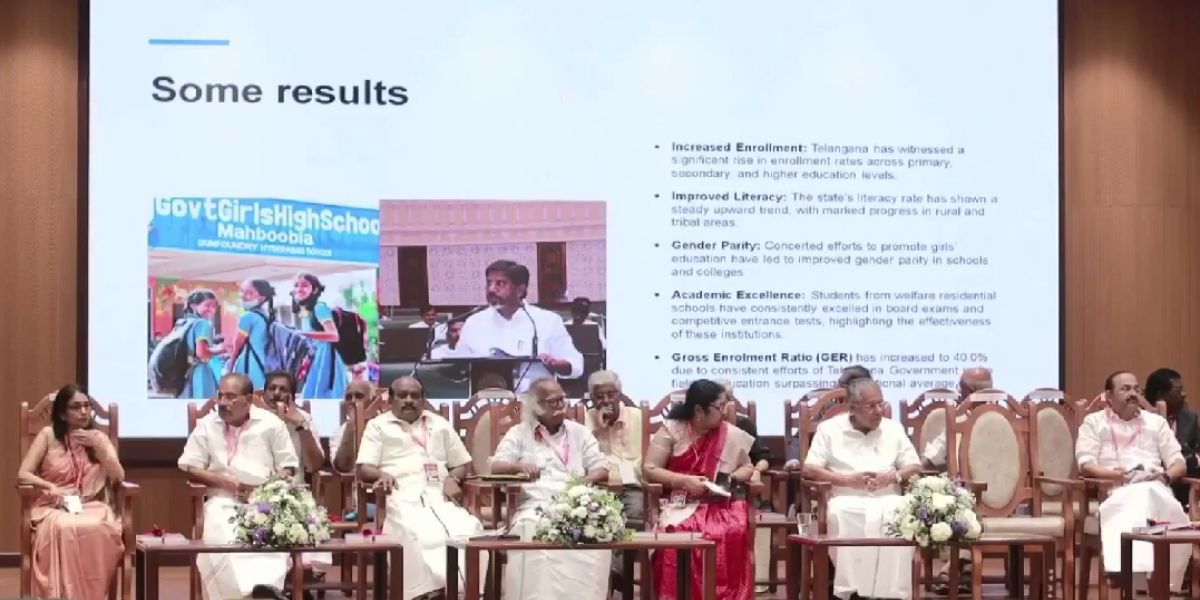The convention aimed to consolidate views from like-minded states and stakeholders to formulate a collective response to the Union government and the UGC against the draft regulations.
Published Feb 20, 2025 | 12:44 PM ⚊ Updated Feb 20, 2025 | 1:14 PM

An image from the national convention in Kerala opposing draft UGC regulations.
Synopsis: The Kerala government hosted a national convention opposing the Draft UGC Regulations, 2025. The event saw participation of representatives from Karnataka, Tamil Nadu and Telangana along with all parties in Kerala. The meeting put forth the view that the regulations infringe upon the basic federal principles.
Stepping up its opposition to the Draft UGC Regulations, 2025, the Kerala government on Thursday, 20 February, hosted a national convention at the Legislative Assembly Complex in Thiruvananthapuram.
The convention, inaugurated by Chief Minister Pinarayi Vijayan, aimed to consolidate views from like-minded states and stakeholders to formulate a collective response to the Union government and the University Grants Commission (UGC) against the draft regulations.
Telangana Deputy Chief Minister Mallu Bhatti Vikramarka, Karnataka Higher Education Minister Dr MC Sudhakar and his Tamil Nadu counterpart Dr Govi Chezhiaan, Leader of the Opposition in the Kerala Assembly VD Satheesan and parliamentary party leaders in the Kerala Assembly participated in the function.
The move follows the Kerala Assembly’s unanimous resolution urging the Union government to withdraw the regulations, citing concerns over federalism and autonomy in higher education. The state had earlier appointed a five-member committee, led by economist Professor Prabhat Patnaik, to frame Kerala’s official response.
By convening this convention, Kerala is taking a firm stance against the draft regulations, positioning itself as a leading voice in the ongoing debate over the Union government’s role in higher education governance.
Chief Minister Pinarayi Vijayan said that the draft UGC regulations needed serious reconsideration as it may undermine the higher education sector of the nation as it had the provision of appointing non-academicians as university Vice-Chancellors (VCs).
According to the chief minister, this provision could be used as a camouflage for political appointments and might infringe upon the states’ rights to manage the universities, even though they were established under state acts.
Vijayan further added that the regulations infringe upon the basic federal principles.
Vikramarka echoed the Kerala chief minister’s views and said that the UGC draft regulations will divest the states’ autonomy. “The very concept is like subverting the role of the state in a subject on the Concurrent list of the Constitution.”
He also pointed out that if enrollment of 3,000 students is made the criterion defining a Higher Education Institute (HEI), then the majority of them will be deprived of good ranking and funding. According to him, in states like Telangana, the institutions that serve backward areas and underprivileged sections of society will be affected seriously.
He further alleged that such provisions were to help corporates.
Vikramarka, while congratulating Kerala for organising the convention, said, “On behalf of the state of Telangana, I propose and welcome the next meeting in Hyderabad to formulate the action plan on behalf of the states.”
He added, “Education is meant to open minds and not to close the doors.”
Meanwhile, Kerala Higher Education Minister R Bindu stated that the draft UGC regulations constitute an immediate incursion on the federal structure outlined in the Indian Constitution.
She also alleged that UGC has become a mere instrument for ideological infiltration and is being used by the Union government for political dominance.
Sudhakar said that Kerala has led the fight against UGC draft regulations to the next level by bringing together policymakers and stakeholders. He pointed out there are some practical issues in the draft regulations like the dual degree programme.
“UGC should have given more emphasis on how to bring the industrial sector to the educational institutions. We have to discuss why the UGC is meddling with states’ rights,” he said.
Professor Patnaik said that three major breaches by the UGC can be cited.
“UGC is supposed to function in consultation with universities. But in the case of draft regulations, they didn’t do that. The UGC which is supposed to deal with only academic matters is calling the shot on the appointment of vice chancellors, which is also a breach. Another one, is the punitive measures which the UGC says it will implement if the universities didn’t accept the regulations,” said Patnaik.
(Edited by Muhammed Fazil.)
